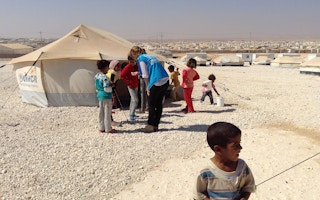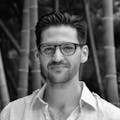Exploiting the fear of refugees has been an easy picking for far-right political parties across Europe. In reality, Syria’s neighbors are shouldering most of the responsibility. Closing up upon itself is not a sustainable solution for Europe.
It is time to change this narrative of fear into one of opportunity. The opportunity to build on the ingenuity brought by people on the move to define a more sustainable growth path for countries, especially those hosting most refugee populations worldwide. A positive approach offers unprecedented areas for investment cooperation and growth.
Take Jordan, where the population of forcibly displaced people from Syria now accounts for almost 10 per cent of the country’s total population. Over 80 per cent of refugees in Jordan live outside of refugee camps, they head for cities and small towns in search of opportunity.
They inevitably increase the pressure on already scarce resources, public services, and jobs. Any solution must be a win-win for both refugees and host populations. Without economic growth, only a handful of the 50,000 young Jordanians entering the labour market each year will find a job. The challenge requires a new way of thinking about sustainable and inclusive growth.
Resource scarcity is being felt. At current rates, Jordan, one of the world’s most water-insecure countries, will completely run out of water by 2060. 97 per cent of its energy is imported, which is guzzling public finances on a scale that threatens to derail the country’s development trajectory.
The pressure on housing has sent rental prices soaring and is making housing a contentious issue with locals. Jordan is an acute example of many refugee-hosting countries struggling with insufficient funds and scarce resources. This type of crisis cannot be rectified through public budgets alone. It is essential that the private sector and governments collaborate on a bigger vision of investment in sustainable and inclusive models of growth.
Moved by this global crisis, investor George Soros recently pledged to invest up to $500 million in companies that benefit migrants and refugees, to harness the power of the private sector for good and hopes that others will do the same. Investments in start-ups and businesses owned by refugees will help create a virtuous cycle.
“
This type of crisis cannot be rectified through public budgets alone. It is essential that the private sector and governments collaborate on a bigger vision of investment in sustainable and inclusive models of growth.
Jordan will be a case in point for investment. But in order to move beyond start-ups to address societal priorities, public investment will have to step in, to prop-up markets that put entrepreneurship and employment on a much larger scale. A shift from thinking about financing start-ups to financing industrial ecosystems is critical to its success.
However, investments and public-private partnerships must crucially focus on solutions to regional sustainable development challenges. Let’s consider one of Jordan’s: energy security. An acute dependence on imported oil and gas is starving public finances. With 300 days of sunshine per year, Jordan’s solar and renewable energy industry has one of the highest potential in the Middle East.
Large solar farms and infrastructure projects have taken off, with support of global financial institutions like the European Bank for Reconstruction and Development. However, small-scale solar PV, which has a bigger potential for job creation and social transformation, is acutely underdeveloped.
Jordanian banks are less willing to lend to small companies due to small project sizes, long payback periods for the local market context, the lack of guarantees and a general lack of understanding of this nascent sector.
In a recent conversation, Raed Byakrat, Vice President for Business Development in the Middle East for First Solar, told me: “Solar energy is capable of transforming lives and driving entrepreneurialism. From construction to maintenance, it offers a range of new opportunities to develop skills and employment.”
This resonates with many international agencies, corporate social responsibility programs and NGOs, which are already supporting projects to build skills among refugee populations on renewable energy. One example is a partnership between the Qatari firm GreenGulf Inc., the Norwegian Refugee Council, and the University of Jordan focused on the Zaatari refugee camp.
However young people that graduate from these courses often lack the support to then create viable entrepreneurial businesses. The international community can help by creating a national solar entrepreneurship program, which matches skills building, enterprise development, and fostering new financing mechanisms for small-and-medium enterprises from local banks.
World Bank President Jim Yong Kim recently said that by 2030, almost half of the world’s extreme poor are expected to live in countries affected by fragility and conflict. In his words, “we need more cooperation, greater economic integration and stronger partnerships than ever before if we want the world economy to return to higher rates of inclusive, sustainable growth.”
Energy is just one area where financing from governments can enable and support private investments into sustainable sectors. We must fast track the collaboration of governments and businesses to turn the pressures of forced displacement into opportunities for sustainable development. Only then we can crucially move the refugee discourse from one of negativity and fear, to one of hope and opportunity.
Alejandro Litovsky is chief executive officer, Earth Security Group. This post is republished from Huffington Post with the author’s permission.


















